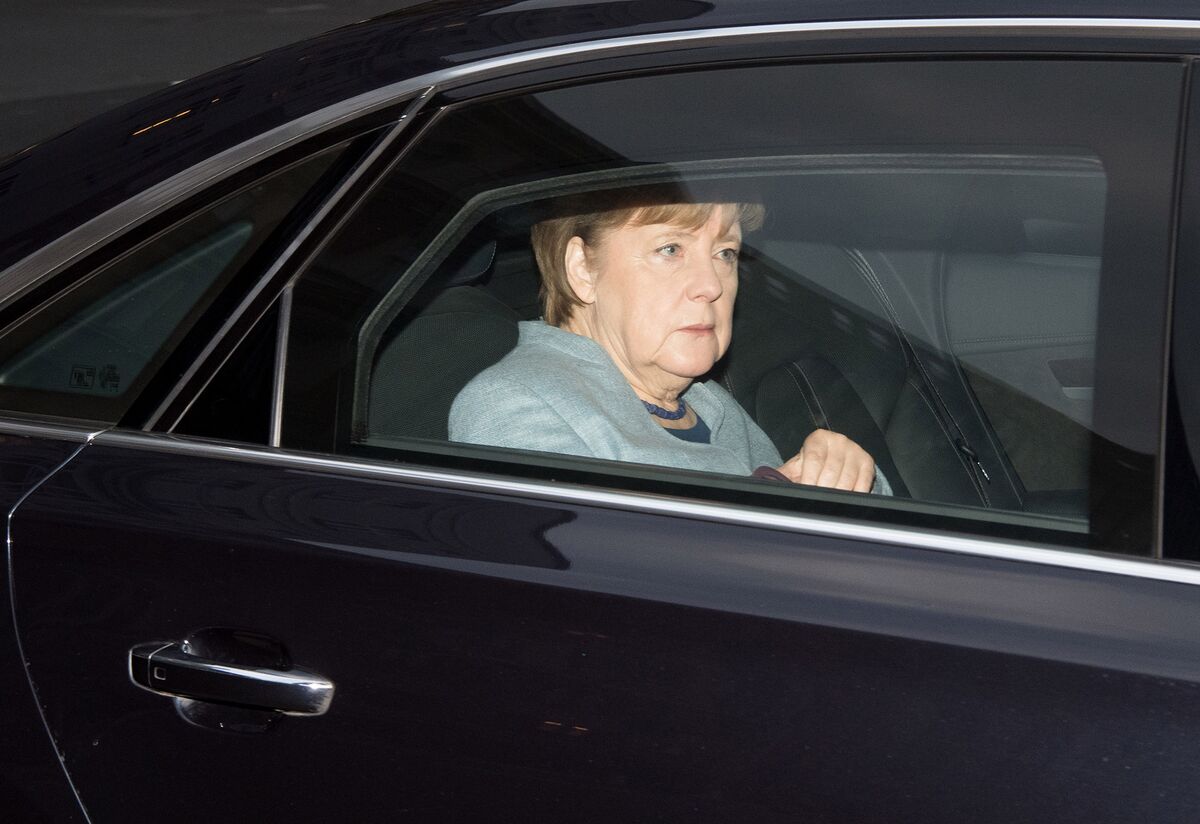
Germany’s Social Democratic Party is looking for ways to sweeten another stint in government with Angela Merkel as the political impasse in Europe’s biggest economy comes to a head.
When 600 SPD delegates vote Sunday on a proposal by party leaders to start formal coalition talks with the chancellor’s bloc, they’ll also be deciding whether Germany heads back to stability or lurches toward a repeat election that risks being as inconclusive as last year’s.
SPD leaders predict a tight vote as the party weighs calls -- including by Merkel -- to help anchor Germany’s political center while young party activists lead a campaign to shun policy compromises and go into opposition. Here’s a look at what’s at stake at the convention in Bonn, the former capital.
The vote
On the table is a 28-page policy outline produced in marathon exploratory talks with Merkel’s Christian Democratic-led bloc on Jan. Delegates must decide if it’s a sufficient basis on which to forge a common platform for government. Critics decry the absence of key Social Democratic demands such as expanding public health insurance and raising taxes on the wealthy. Party head Martin Schulz, backed by the SPD’s regional prime ministers, many lawmakers and labor leaders, has spent the week trying to sell the plan to the party base.
The sweeteners
In a concession to the SPD, the framework deal includes a mid-term review of any coalition pact, which would normally run through 2021. Schulz denies it’s an escape hatch for the SPD, which fell to its worst election defeat since World War II after serving as Merkel’s junior partner for the last four years. Framing the clause as a win for the SPD is likely to play a role when party leaders seek potentially decisive swing support at the convention from membership-heavy state chapters in the key industrial regions of North Rhine-Westphalia, Baden-Wuerttemberg and Bavaria. Schulz and Merkel both say that full-scale coalition talks will give the SPD a chance to improve on the initial deal.
Getting to yes
Should Schulz succeed in his mission to win over delegates, then Merkel, her Bavarian CSU allies and the SPD could sit down for negotiations on a full policy agenda and cabinet posts next week. Volker Kauder, Merkel’s chief lieutenant in parliament, said the exercise could wrap up in two weeks. But that’s not the end of it: the SPD will put the accord to a vote of its more than 400,000 members.
A ‘No’ Vote
If opponents of another “grand coalition” with Merkel prevail, Germany -- and by extension Europe -- faces a bout of political instability with no clear outcome. While no successor to the chancellor is immediately in sight, questions about Merkel’s future after 12 years in office would intensify, though there’s no constitutional limit for her to stay on as acting chancellor. One option for Merkel would be to try to govern without a majority, a novelty for postwar Germany but a scenario she is reluctant to pursue. The second is a new election, which polls suggest would resolve nothing. Both carry inherent risks.
Minority government
It’s never been tried in the 69-year history of the Federal Republic. But short of the equally unprecedented step of holding a repeat election, a government supported by parties outside a coalition may be the only option. With only 246 seats in the 709-member lower house, Merkel’s bloc would rely on shifting majorities to pass legislation. Consensus policies such as public infrastructure investment, increased funding for old-age care and expanding broadband access could be on the agenda. Measures to strengthen Europe would probably find favor with the Social Democrats and Greens. such an arrangement wouldn’t be stable -- and probably wouldn’t last a full four years.
Another election
Attention would shift to whether Merkel has her bloc’s support for running again, which she has vowed to do if a repeat election becomes inevitable. Skepticism has been growing among critics who want to pull her Christian Democratic Union and the Bavarian CSU to the right. “If she doesn’t manage now to get the Social Democrats behind her and have a grand coalition, I think her days will also be counted and she will probably not serve the full four years,” Guntram Wolff, director of Bruegel, a Brussels-based research group, said in a Bloomberg Television interview.
Yet while Merkel would come under pressure to stand aside in favor of a candidate better able to unify her bloc, her opponents are hobbled by the lack of a recognizable face to take her place. And she remains popular with the voting public. A ‘No’ vote by the SPD would mean all bets are off, and it’s even conceivable that Germany could be in the same situation six months from now.
— With assistance by Matthew Miller.


0 comments:
Post a Comment